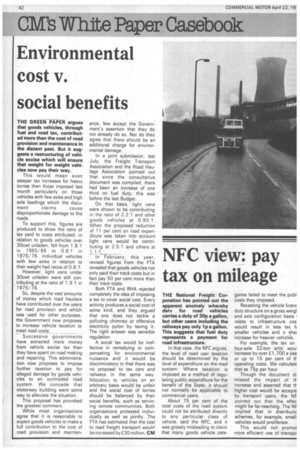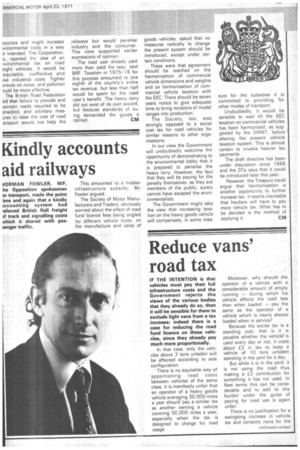NFC view: pay tax on mileage
Page 44

Page 45

If you've noticed an error in this article please click here to report it so we can fix it.
THE National Freight Corporation has pointed out the apparent anomaly whereby dery for road vehicles carries a duty of 30p a gallon, but other users including the railways pay only 1 p a gallon. This suggests that fuel duty represents a payment for road infrastructure.
In that case, the NFC argues, the level of road user taxation should be determined by the level of expenditure on the road system. Where taxation is imposed as a method of regulating public expenditure for the benefit of the State, it should not normally be applicable to commercial users.
About 75 per cent of the total costs of the road system could not be attributed directly to any particular class of vehicle, said the NFC, and it was grossly misleading to claim that many goods vehicle cate gories failed to meet the publ costs they imposed.
Recasting the vehicle licenc duty structure on a gross weigl and axle configuration basis 1 relate to infrastructure cos would result in less tax -h smaller vehicles and a shar increase for heavier vehicle's.
For example, the tax on four-axle 32-ton artic woul increase by over -£1,700 a yea or up to 15 per cent of th operating costs. We calculate that as 75p per hour.
Though the document di missed the impact of th increase and asserted that tlhigher cost would be accepte by transport users, the NF pointed out that the effec might be far-reaching. The NF implied that in distributic schemes, for example, small, vehicles would proliferate.
This would not promot more efficient use of transpo
sources and might increase ivironmental costs in a way rt intended. The Corporation, o, rejected the idea of an wironmental tax on road aight vehicles. It would be equitable, ineffective and lise industrial costs. Tighter )ntrols on noise, and pollution .ould be more effective.
The British Road Federation )id that failure to provide and laintain roads required to be 2medied, and arbitrary meaures to raise the cost of road .ansport would not help the
railways but would penalise industry and the consumer. This view supported earlier expressions of opinion.
The road user already paid more than paid his way, said BRF. Taxation in 1975i]6 for this purpose amounted to one eighth of the country's entire tax revenue, but less than half would be spent for the road user's benefit. The heavy lorry did not exist of its own accord, but because standards of living demanded the goods it
carried. CM




















































































